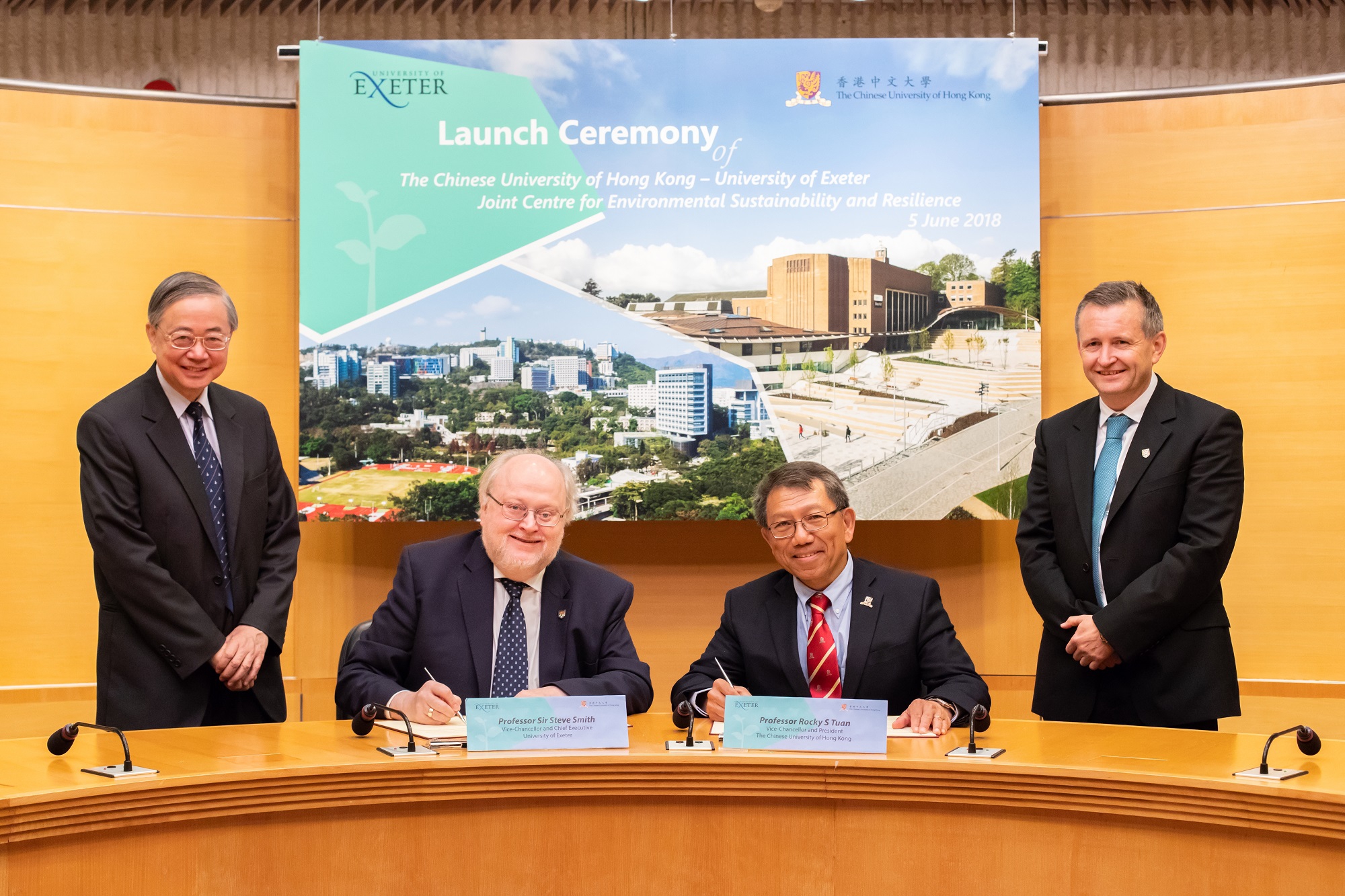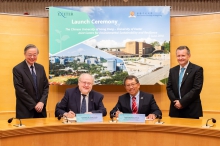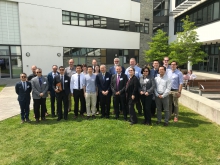CUHK
News Centre
CUHK and the University of Exeter Launch Joint Centre toPromote Environmental Sustainability and Resilience First of its kind Joint Centre in Hong Kong
The Chinese University of Hong Kong (CUHK) and the University of Exeter launched a new HK$20m joint research centre named “CUHK – University of Exeter Joint Centre for Environmental Sustainability and Resilience” (ENSURE) today (5 June) at CUHK. The first of its kind in Hong Kong, this joint endeavour aims to embark on large, impactful interdisciplinary collaborations to tackle emerging issues related to a changing environment and human health and wellbeing. ENSURE will serve as a platform for international academic exchange, promoting policy related works, and nurturing the next generation of young researchers to address sustainable development challenges. Officiating at the launch ceremony were Professor Rocky S. Tuan, Vice-Chancellor and President of CUHK and Professor Sir Steve Smith, Vice-Chancellor and Chief Executive of the University of Exeter.
Drawing on the complementary strengths of the two universities, CUHK and the University of Exeter enter into this long-term partnership to strengthen research impact and visibility globally. The joint research effort reflects their common vision in promoting interdisciplinary research excellence which delivers benefits by tackling grand challenges and fulfilling societal needs globally.
Professor Rocky S. Tuan, Vice-Chancellor and President of CUHK, remarked, “CUHK is committed to addressing the United Nation Sustainable Development Goals (SDGs) for the betterment of Hong Kong and the worldwide community. We are proud to establish ENSURE with the University of Exeter, a member of the elite Russell Group of leading research-intensive universities in the UK which commands a leading position in climate, health, and environmental research. With strong expertise from both universities, I am confident that we will be able to find solutions to sustain a liveable environment and to ensure safe access to food, water, and air in the coming century.”
Professor Sir Steve Smith, Vice-Chancellor and Chief Executive of the University of Exeter, said, “Ensuring resilience in the face of evolving interactions between ourselves and our environment is one of today’s most important global challenges. Exeter is world-leading in the fields of climate, environment and health research. Our existing strong collaborations include the Met Office—the UK’s weather and climate research centre—and our world-leading research includes our European Centre for Environment and Human Health. ENSURE is pioneering, and brings together our strengths with the wealth of expertise at CUHK. Together we have a unique opportunity to provide transformative solutions and make a real difference worldwide.”
A workshop was recently held at the University of Exeter, bringing together over 30 researchers from a wide range of disciplines to discuss the forming of large-scale collaborative projects in the coming years. This was led by Professor Gabriel Ngar-cheung Lau and Professor Gavin Shaddick, Co-Directors of ENSURE.
Professor Lau is excited about the new collaboration opportunities ahead, “A collective effort from across disciplines and sectors, at home and abroad, is needed in tackling global environmental challenges. Capitalising on the strengths and interests of the investigators from CUHK and the University of Exeter, ENSURE will conduct innovative and collaborative research on various environmental issues of strong social relevance to advance global sustainable development.”
Professor Gabriel Ngar-cheung Lau, currently Director of the Institute of Environment, Energy and Sustainability (IEES) at CUHK, is a world-renowned scholar in climate research who has been devoted to meteorological research for over 40 years. He was a contributing author of the Fourth Assessment Report and a lead author of the Fifth Assessment Report of the Intergovernmental Panel on Climate Change, which was recognised by the 2007 Nobel Peace Prize.
Professor Gavin Shaddick, currently the Chair of Data Science and Statistics and Head of the Department of Mathematics at the University of Exeter, is an acknowledged expert in the environment and health, with over 20 years of experience in data intensive research. He leads the Data Integration Task Force of the World Health Organization Global Platform on Air Quality and Health, is actively involved in the calculation of a number of SDG metrics, and serves on the UK government’s Committee on the Medical Effects of Air Pollutants (COMEAP) and its subgroup on the Quantification of Air Pollution Risks (QUARK).
Professor Shaddick remarked, “This Centre provides a fantastic opportunity to engage in truly meaningful collaborations with colleagues at CUHK in one of the most important challenges facing society today. By working together to better understand the complex interactions between climate, environment, and health, we will produce interdisciplinary research with significant global impact.”
The Chinese University of Hong Kong (www.cuhk.edu.hk)
Founded in 1963, CUHK is a leading comprehensive research university committed to research and education excellence with a global reputation. Located in the heart of Asia, CUHK has a vision and a mission to combine tradition with modernity, and to bring together China and the West. Under the University’s unique collegial system, the programmes and activities offered by its nine colleges complement the formal curricula by delivering whole-person education and pastoral care. The University has eight faculties: Arts, Business Administration, Education, Engineering, Law, Medicine, Science, and Social Science. Together with the Graduate School, the University offers over 300 undergraduate and postgraduate programmes. All faculties are actively engaged in research in a wide range of disciplines, with an array of research institutes and research centres specialising in interdisciplinary research of the highest quality.
CUHK is recognised as the most innovative university in Hong Kong and is ranked 22ndin the Asia-Pacific region by the latest ‘Reuters: Asia Pacific’s Most Innovative Universities’ listing. The University houses a number of research institutes and organisations dedicated to the advancement of sustainable development, including IEES, the Institute of Future Cities, the Jockey Club Museum of Climate Change, and the Hong Kong Chapter of the United Nations Sustainable Development Solutions Network.
University of Exeter (www.exeter.ac.uk)
The University of Exeter is a Russell Group university that combines world-class research with very high levels of student satisfaction. It has over 21,000 students and is in the top one per cent of universities worldwide. The University of Exeter is also ranked 14th in The Times and The Sunday Times Good University Guide 2018 and 14th in the Guardian University Guide 2019. In the 2014 Research Excellence Framework (REF), the University ranked 16th nationally, with 98% of its research rated as being of international quality, while in 2017, it was awarded a Gold rating in the Teaching Excellence Framework (TEF) assessment. It was The Sunday Times University of the Year 2012–13.
The University of Exeter launched its flagship Living Systems Institute in 2016, a world-class, interdisciplinary research community that will revolutionise the diagnosis and treatment of diseases. This follows recent investments of more than £350 million worth of new facilities across its campuses in recent years, including landmark new student services centres; The Forum in Exeter and The Exchange on the Penryn Campus in Cornwall, together with world-class new facilities for Biosciences, the Business School, and the Environment and Sustainability Institute.
Prof. Rocky S. Tuan (right), Vice-Chancellor and President, CUHK, and Prof. Sir Steve Smith, Vice-Chancellor and Chief Executive, University of Exeter (left), sign an Agreement for the establishment of ENSURE, witnessed by Prof. Gabriel Lau, Co-Director of ENSURE, CUHK and Professor Gavin Shaddick, Co-Director of ENSURE, University of Exeter
(From left) Prof. Rocky S. Tuan, Vice-Chancellor and President, CUHK; Professor Gavin Shaddick, Co-Director of ENSURE, University of Exeter; Prof. Mark Goodwin, Deputy Vice-Chancellor (External Engagement), University of Exeter; Prof. Gabriel Lau, Co-Director of ENSURE, CUHK; Prof. Sir Steve Smith, Vice-Chancellor and Chief Executive, University of Exeter; and Prof. Fanny Cheung, Pro-Vice-Chancellor of CUHK
CUHK and the University of Exeter Launch Joint Centre toPromote Environmental Sustainability and Resilience First of its kind Joint Centre in Hong Kong
The Chinese University of Hong Kong (CUHK) and the University of Exeter launched a new HK$20m joint research centre named “CUHK – University of Exeter Joint Centre for Environmental Sustainability and Resilience” (ENSURE) today (5 June) at CUHK. The first of its kind in Hong Kong, this joint endeavour aims to embark on large, impactful interdisciplinary collaborations to tackle emerging issues related to a changing environment and human health and wellbeing. ENSURE will serve as a platform for international academic exchange, promoting policy related works, and nurturing the next generation of young researchers to address sustainable development challenges. Officiating at the launch ceremony were Professor Rocky S. Tuan, Vice-Chancellor and President of CUHK and Professor Sir Steve Smith, Vice-Chancellor and Chief Executive of the University of Exeter.
Drawing on the complementary strengths of the two universities, CUHK and the University of Exeter enter into this long-term partnership to strengthen research impact and visibility globally. The joint research effort reflects their common vision in promoting interdisciplinary research excellence which delivers benefits by tackling grand challenges and fulfilling societal needs globally.
Professor Rocky S. Tuan, Vice-Chancellor and President of CUHK, remarked, “CUHK is committed to addressing the United Nation Sustainable Development Goals (SDGs) for the betterment of Hong Kong and the worldwide community. We are proud to establish ENSURE with the University of Exeter, a member of the elite Russell Group of leading research-intensive universities in the UK which commands a leading position in climate, health, and environmental research. With strong expertise from both universities, I am confident that we will be able to find solutions to sustain a liveable environment and to ensure safe access to food, water, and air in the coming century.”
Professor Sir Steve Smith, Vice-Chancellor and Chief Executive of the University of Exeter, said, “Ensuring resilience in the face of evolving interactions between ourselves and our environment is one of today’s most important global challenges. Exeter is world-leading in the fields of climate, environment and health research. Our existing strong collaborations include the Met Office—the UK’s weather and climate research centre—and our world-leading research includes our European Centre for Environment and Human Health. ENSURE is pioneering, and brings together our strengths with the wealth of expertise at CUHK. Together we have a unique opportunity to provide transformative solutions and make a real difference worldwide.”
A workshop was recently held at the University of Exeter, bringing together over 30 researchers from a wide range of disciplines to discuss the forming of large-scale collaborative projects in the coming years. This was led by Professor Gabriel Ngar-cheung Lau and Professor Gavin Shaddick, Co-Directors of ENSURE.
Professor Lau is excited about the new collaboration opportunities ahead, “A collective effort from across disciplines and sectors, at home and abroad, is needed in tackling global environmental challenges. Capitalising on the strengths and interests of the investigators from CUHK and the University of Exeter, ENSURE will conduct innovative and collaborative research on various environmental issues of strong social relevance to advance global sustainable development.”
Professor Gabriel Ngar-cheung Lau, currently Director of the Institute of Environment, Energy and Sustainability (IEES) at CUHK, is a world-renowned scholar in climate research who has been devoted to meteorological research for over 40 years. He was a contributing author of the Fourth Assessment Report and a lead author of the Fifth Assessment Report of the Intergovernmental Panel on Climate Change, which was recognised by the 2007 Nobel Peace Prize.
Professor Gavin Shaddick, currently the Chair of Data Science and Statistics and Head of the Department of Mathematics at the University of Exeter, is an acknowledged expert in the environment and health, with over 20 years of experience in data intensive research. He leads the Data Integration Task Force of the World Health Organization Global Platform on Air Quality and Health, is actively involved in the calculation of a number of SDG metrics, and serves on the UK government’s Committee on the Medical Effects of Air Pollutants (COMEAP) and its subgroup on the Quantification of Air Pollution Risks (QUARK).
Professor Shaddick remarked, “This Centre provides a fantastic opportunity to engage in truly meaningful collaborations with colleagues at CUHK in one of the most important challenges facing society today. By working together to better understand the complex interactions between climate, environment, and health, we will produce interdisciplinary research with significant global impact.”
The Chinese University of Hong Kong (www.cuhk.edu.hk)
Founded in 1963, CUHK is a leading comprehensive research university committed to research and education excellence with a global reputation. Located in the heart of Asia, CUHK has a vision and a mission to combine tradition with modernity, and to bring together China and the West. Under the University’s unique collegial system, the programmes and activities offered by its nine colleges complement the formal curricula by delivering whole-person education and pastoral care. The University has eight faculties: Arts, Business Administration, Education, Engineering, Law, Medicine, Science, and Social Science. Together with the Graduate School, the University offers over 300 undergraduate and postgraduate programmes. All faculties are actively engaged in research in a wide range of disciplines, with an array of research institutes and research centres specialising in interdisciplinary research of the highest quality.
CUHK is recognised as the most innovative university in Hong Kong and is ranked 22ndin the Asia-Pacific region by the latest ‘Reuters: Asia Pacific’s Most Innovative Universities’ listing. The University houses a number of research institutes and organisations dedicated to the advancement of sustainable development, including IEES, the Institute of Future Cities, the Jockey Club Museum of Climate Change, and the Hong Kong Chapter of the United Nations Sustainable Development Solutions Network.
University of Exeter (www.exeter.ac.uk)
The University of Exeter is a Russell Group university that combines world-class research with very high levels of student satisfaction. It has over 21,000 students and is in the top one per cent of universities worldwide. The University of Exeter is also ranked 14th in The Times and The Sunday Times Good University Guide 2018 and 14th in the Guardian University Guide 2019. In the 2014 Research Excellence Framework (REF), the University ranked 16th nationally, with 98% of its research rated as being of international quality, while in 2017, it was awarded a Gold rating in the Teaching Excellence Framework (TEF) assessment. It was The Sunday Times University of the Year 2012–13.
The University of Exeter launched its flagship Living Systems Institute in 2016, a world-class, interdisciplinary research community that will revolutionise the diagnosis and treatment of diseases. This follows recent investments of more than £350 million worth of new facilities across its campuses in recent years, including landmark new student services centres; The Forum in Exeter and The Exchange on the Penryn Campus in Cornwall, together with world-class new facilities for Biosciences, the Business School, and the Environment and Sustainability Institute.









